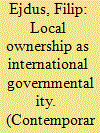| Srl | Item |
| 1 |
ID:
155691


|
|
|
|
|
| Summary/Abstract |
One of the core principles of EU interventions under the Common Security and Defence Policy (CSDP) has been local ownership. While the EU takes pride in fully respecting this principle, the existing research suggests that the implementation has been far from smooth. However, we still know very little how this principle is conceptualised and operationalised, let alone why its implementation has been so difficult. Drawing on document analysis and 27 in-depth interviews, the article makes 3 arguments. First, ownership is increasingly construed in the EU policy rhetoric as a middle ground between imposition and restraint. Second, in practice, ownership is operationalised as an externally driven, top-down endeavour, resulting in the low degree of local participation. Third, in addition to the obstacles normally faced by other peace-builders, the EU’s efforts to implement ownership are constrained by the politics and policy-making of CSDP. The arguments are illustrated in a case study of the European Union Mission on Regional Maritime Capacity Building in the Horn of Africa (EUCAP Nestor).
|
|
|
|
|
|
|
|
|
|
|
|
|
|
|
|
| 2 |
ID:
157978


|
|
|
|
|
| Summary/Abstract |
While some Foucault-inspired studies construe local ownership in international interventions as a form of liberal governmentality that aims to govern through freedom, others lambast it as an illiberal governmentality that is likely to be resisted because it undermines local autonomy. However, we still do not know what is the rationality behind local ownership, how it is being operationalized, and why a principle that aims to govern through freedom ends up curtailing it. I argue that local ownership, echoing the colonial principle of indirect rule, is driven by the rationality of advanced democracies on how best to govern global insecurities at a distance. Consequently, ownership is operationalized as responsibilization for externally designed objectives. This often gives rise to local resistance which undermines international efforts to achieve ownership. I illustrate my arguments with evidence from the EU Mission on Regional Maritime Capacity Building in the Horn of Africa (EUCAP Nestor).
|
|
|
|
|
|
|
|
|
|
|
|
|
|
|
|